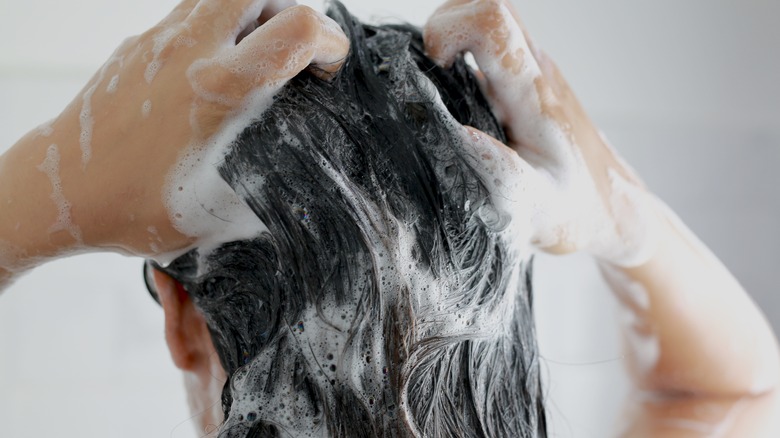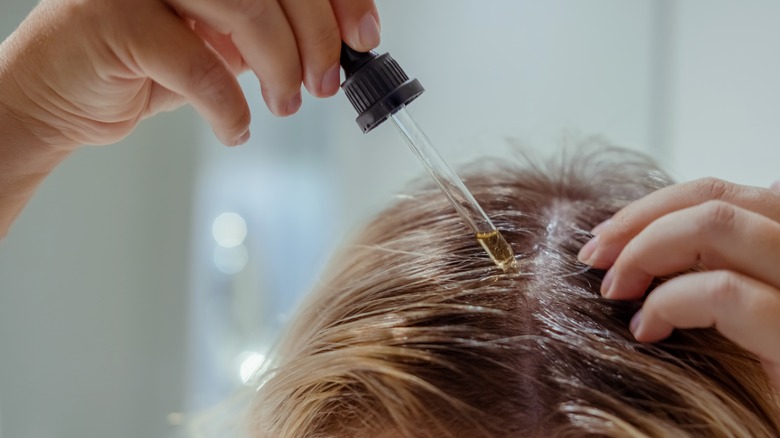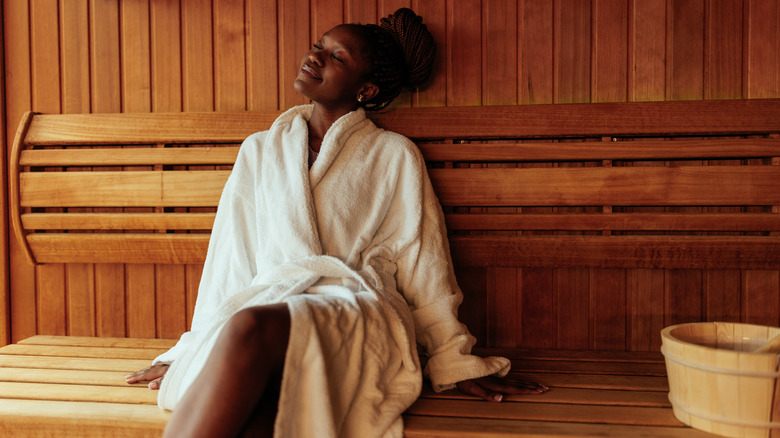Can You Really Thicken Your Hair Naturally? Here's What To Know
We don't get to choose what type of hair we're born with, and in a world where comparison is everything, having thick hair feels more essential than ever. We're all susceptible to changing and treating our hair to make it look effortlessly thick and shiny, whether you're attempting to fake a voluminous ponytail or dimensional highlights for fuller-looking hair. If you weren't born with naturally luscious locks, fear not — there are a multitude of ways to naturally promote hair growth and a healthy shine.
Promoting hair growth can also be essential for anyone who's experiencing a high degree of hair loss, which can be affected by factors beyond genetics such as pregnancy, stress, and chronic conditions. When it comes to conditions that can be affected by genetics, it's important to visit your doctor in case an underlying issue needs to be identified. If not, there are natural and science-backed ways to thicken hair beyond supplements or clinical treatments. Let's dive in.
It starts with diet
Typical, we know — but diet really is where health starts. According to board-certified dermatologist Dr. Dhaval Bhanusali, "a host of nutritional deficiencies can cause hair loss and hair breakage," he explained to Real Simple, telling us how healthcare professionals will assess the situation. "Doctors and dermatologists look at things like iron levels, vitamin D, thyroid studies, and other medical data points to make sure we don't miss any internal causes of thinning or weakening hair." With that being said, there are a few foods essential to promoting hair growth.
Foods that are rich in proteins, vitamins, and minerals — such as fish, avocados, and nuts — are incredibly effective when it comes to hair growth and general health. It's especially important to focus on consuming protein, per MindbodyGreen. Our hair is made up almost entirely of protein molecules, which means nourishing our body with the right ingredients will help our hair health extensively. Once your nutritional deficiencies are identified, it's time to incorporate these missing ingredients into your diet.
The myth of sulfates
Sulfates may allow your shampoo to build foam, but the impact of sulfates on hair is detrimental. Per Real Simple, sulfates quickly strip away the natural moisturizer and oils of our hair, leaving the scalp dry and irritated. With an irritated scalp, hair growth will be the least of your concerns. While those with extremely healthy hair may not witness the harsh effects of sulfate shampoo, anyone with coarse, dry, or thinning hair will. It's best to opt for a sulfate-free shampoo that can cleanse the hair and scalp without stripping them of their natural oils.
Additionally, sulfate-free shampoo is perfect for those of us healing from years' worth of heat styling and dyeing. Sulfates will immediately remove any keratin (the protein that helps hair grow strong) from the scalp. If money permits, swap out a cheap and sulfated formula for a sulfate-free and hydrating shampoo. To avoid further inflammation and breakage, stay away from dry shampoo and wash your hair more regularly instead.
Consistent scalp oiling and massaging
We're here to address the rumors: scalp oiling and massaging are some of the best natural remedies to promote hair growth. Scalp oiling and massaging is an ancient Indian Ayurvedic treatment, dating back to nearly 5,000 years ago. According to Ayurvedic clinician Dr. Aruna Purohit, "Ayurvedic head massaging techniques or 'murdha taila' revitalize our three higher 'chakras' — body, mind, and spirit — while bringing balance to our core biological forces, Vata, Pitta, and Kapha, which control various aspects of our health," she explained to Vogue India.
Dr. Purohit also explained to readers the most effective way to apply and massage oil onto the scalp. To start, dry brush hair until completely untangled, preferably with a bamboo brush (due to their gentle and stimulating bristles). Using a dropper, apply oil all over the scalp and begin massaging with your fingers. If possible, use a silicone scalp massager to further massage oils into the hair and distribute them across the scalp. Finish off by braiding hair and washing after 2-3 hours. Incorporate a daily scalp massage into your routine, oil hair before washing, and you'll notice a difference over time.
Stress management
The most difficult yet rewarding task: managing our stress. According to the Mayo Clinic, significant stress levels can cause large amounts of hair to, quite literally, lay to rest. The most drastic type of stress-induced hair loss is called telogen effluvium, which causes hair to fall out within the span of a few months. Other types of hair loss, such as trichotillomania and alopecia, are caused by a compulsion to pull hair out or lose it over time. If you've recently noticed sudden hair loss, stress could be the largest factor.
Managing stress isn't easy, and it often requires a significant amount of time, effort, and money. However, learning efficient skills to keep our minds in check can help with overall health, including the health of our hair. Investing in ways to cope, like therapy, shadow work, working out, spending time with close friends, and journaling are all examples of stress management. Be open to experimentation, see what sticks, and find a routine that works well for you. We promise you can do it, and over time, you'll likely notice a pattern of long and luscious locks.




